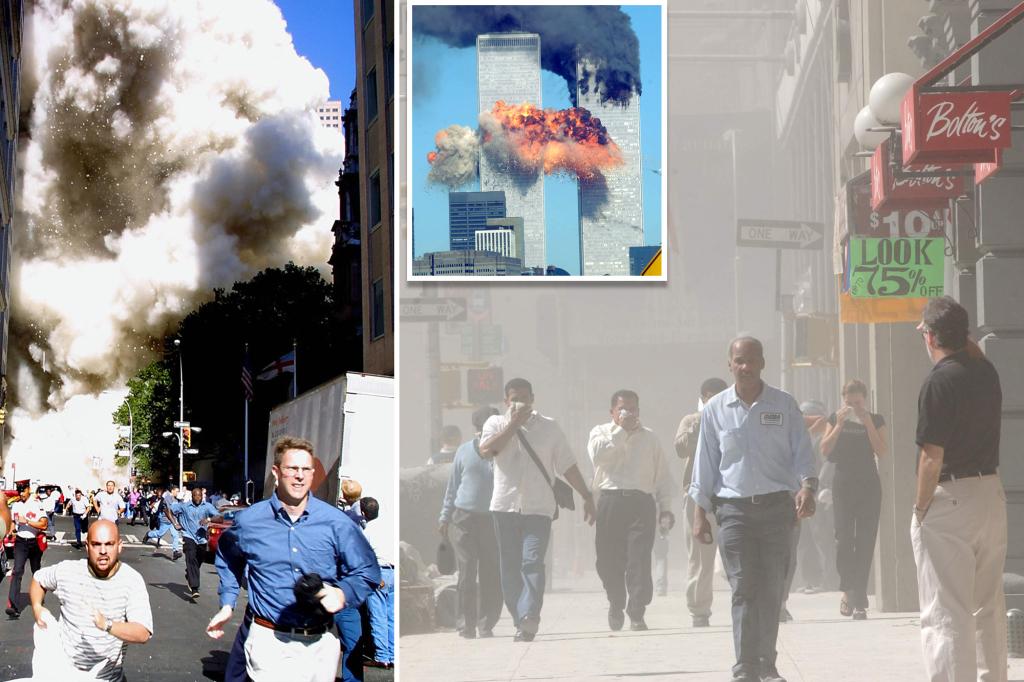The new legislation will require businesses in lower Manhattan and northern Brooklyn during Sept. 11, 2001, terror attacks to contact workers employed during that time who may have been exposed to life-threatening toxins .
The 9/11 Notice Act was unanimously passed by both the state Assembly and Senate.
Governor Kathy Hochul is reviewing the bill and will likely approve it before the 9/11 anniversary. It hasn’t yet been sent to her desk.
Assemblyman Nader Sayegh (D-Yonkers) said he drafted the legislation following the 20th anniversary of the 9/11 terrorist attacks.
Sayegh said he was spurred into action after learning that of the 400,000 civilians exposed to 9/11 toxins, only a small percentage with qualifying medical conditions had registered for the 9/11 Victim Compensation Fund and the World Trade Center Health Program .
Both provide free monitoring and treatment for eligible individuals with WTC-related illnesses.


By comparison, more than 80% of first responders have registered with the federal health and compensation programs.
Under the measure, employees who worked near Ground Zero between September 2001 and the end of May 2002 need to be contacted by their employers and former employers and made aware of their right to seek medical compensation.
“It is nearly 22 years after the terrorist attacks and an utter lack of awareness about the benefits and eligibility for the federal World Trade Center Health Program and 9/11 Victim Compensation Fund means we needed to act,” Sayegh said.


“The 9/11 Notice Act means that forgotten victims, including downtown office workers, doormen, construction workers, students, teachers, retail workers, and delivery people, must be notified of their eligibility status by their ex-employer. No one should be left to suffer from 9/11-related illness and be burdened with overwhelming medical bills when the federal resources are FREE and available to help them.”
Sen. Brian Kavanagh (D-Manhattan), who shepherded the bill through the upper house and whose district includes the World Trade Center site and is home to many 9/11 survivors, said many people “may be experiencing WTC-related illnesses and may be eligible for financial and healthcare benefits, but may not realize that they are.”
The Post has reported numerous cases of people — students as well as workers and first responders– stricken with cancers and other illnesses after being exposed to toxins following the collapse of the World Trade Center towers.


Freak illnesses include men who got breast cancer .
Of the 400,000 people exposed to Ground Zero toxins on 9/11 and afterward, 57,000 were residents south of Canal Street, as well as 15,000 students and staffers at downtown Manhattan schools, like Stuyvesant High School.
Assemblyman Gary Pretlow (D Mount Vernon) said more people have died from 9/11 health-related illnesses — nearly 6,000 — than the 2,977 victims killed that day.
“I will never forget the smell of burning metal and the sight of the chalky dust cloud that engulfed Lower Manhattan after the terrorist attack on 9/11,” he recounted. “More than two decades later, the potent smell and powdery dust are gone; however, the effects of the toxins still linger, causing more than 5,891 deaths since 9/11—more than the death toll on that terrible day.”

Tommy Steed, Chairman of the Association of BellTel Retirees, representing 134,000 retirees from Verizon, AT&T, and Empire City Subway, noted many who toiled in Ground Zero to repair communication lines after the terrorists attacked.
“Land lines were dead, cell phones had no signals, high-speed data could not transmit and federal, state, and regional first responders lacked a reliable means to connect,” he said.
“It was our members who were called in on Day 1, to restore service in Lower Manhattan and for the reopening of the financial markets. What we didn’t plan for was being exposed to the world’s largest and most toxic burn pit.”

